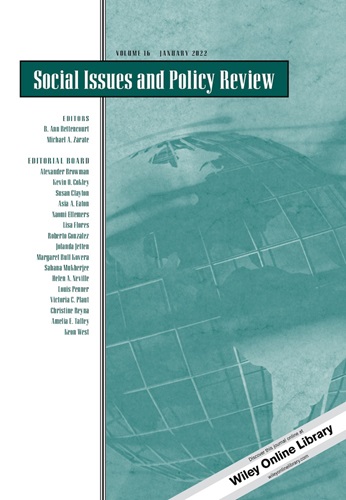自然绿色:利用石器时代的心理偏见来培养环保行为
IF 5.6
1区 心理学
Q1 PSYCHOLOGY, SOCIAL
引用次数: 101
摘要
人们普遍认为人类必须减少对环境的影响。我们建议,更好地理解我们进化的人性有助于改进解决环境问题的计划和政策。结合进化和社会心理学的方法,我们认为环境问题通常是由五种进化适应性心理偏见引起或加剧的:人类(1)重视个人结果而不是集体结果(自利),(2)喜欢即时奖励而不是延迟奖励(短视),(3)重视相对地位而不是绝对地位(地位),(4)复制他人的行为(社会模仿),以及(5)忽略我们看不到或感觉不到的问题(感知)。通过考虑这五种“石器时代”偏见如何以及为什么继续影响现代环境实践,尽管承认个人和文化差异的作用,我们提出了利用人性制定干预策略的新方法,以减少资源枯竭,限制浪费消费,遏制人口过剩,促进绿色选择。©2014社会问题心理研究学会。本文章由计算机程序翻译,如有差异,请以英文原文为准。
Naturally Green: Harnessing Stone Age Psychological Biases to Foster Environmental Behavior
It is widely agreed that humans must reduce their environmental impact. We propose that an improved understanding of our evolved human nature can help to improve programs and policies to address environmental problems. Combining evolutionary and social psychological approaches, we argue that environmental problems are often caused or exacerbated by five evolutionarily adaptive psychological biases: Humans (1) value personal over collective outcomes (self-interest), (2) prefer immediate over delayed rewards (shortsightedness), (3) value relative over absolute status (status), (4) copy the behaviors of others (social imitation), and (5) ignore problems that we cannot see or feel (sensing). By considering how and why these five "Stone Age" biases continue to influence modern environmental practices, although acknowledging the role of individual and cultural differences, we present novel ways that human nature can be harnessed to develop intervention strategies to lessen resource depletion, restrain wasteful consumption, curb overpopulation, and foster green choices. © 2014 The Society for the Psychological Study of Social Issues.
求助全文
通过发布文献求助,成功后即可免费获取论文全文。
去求助
来源期刊

Social Issues and Policy Review
Multiple-
CiteScore
22.20
自引率
1.10%
发文量
9
期刊介绍:
The mission of Social Issues and Policy Review (SIPR) is to provide state of the art and timely theoretical and empirical reviews of topics and programs of research that are directly relevant to understanding and addressing social issues and public policy.Papers will be accessible and relevant to a broad audience and will normally be based on a program of research. Works in SIPR will represent perspectives directly relevant to the psychological study of social issues and public policy. Contributions are expected to be review papers that present a strong scholarly foundation and consider how research and theory can inform social issues and policy or articulate the implication of social issues and public policy for theory and research.
 求助内容:
求助内容: 应助结果提醒方式:
应助结果提醒方式:


